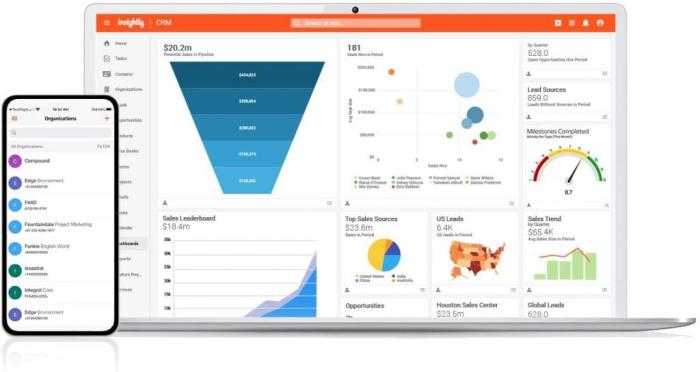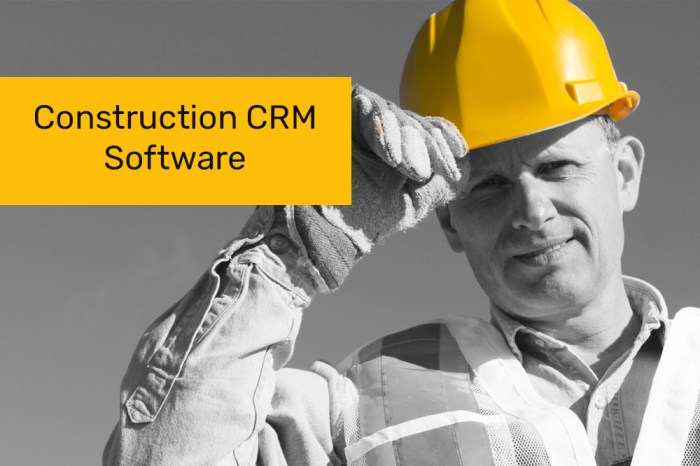Crm software for contractors – The construction industry is demanding. Juggling multiple projects, clients, subcontractors, and materials requires meticulous organization and efficient communication. This is where Customer Relationship Management (CRM) software steps in, offering contractors a powerful tool to enhance productivity, improve client relationships, and ultimately, boost profitability. This comprehensive guide delves into the benefits, features, and selection process of CRM software specifically designed for the needs of contractors.
Why Contractors Need CRM Software
Contractors often grapple with challenges like disorganized communication, missed deadlines, and difficulty tracking project progress. A dedicated CRM system addresses these pain points by centralizing crucial information, improving team collaboration, and streamlining workflows. Here’s how:
Improved Client Management
- Centralized Client Database: Store all client information – contact details, project history, communication logs, and payment details – in one easily accessible location. This eliminates the need for scattered spreadsheets and ensures everyone on your team has the same up-to-date information.
- Enhanced Communication: Integrate email, SMS, and even video conferencing directly within the CRM, ensuring consistent and timely communication with clients. Automated email reminders for appointments and project updates keep clients informed and reduce the risk of missed deadlines.
- Improved Client Satisfaction: By providing exceptional service and proactive communication, CRM systems help foster stronger client relationships, leading to repeat business and positive referrals.
Streamlined Project Management
- Task Management & Scheduling: Assign tasks to team members, set deadlines, and track progress in real-time. This ensures projects stay on schedule and within budget.
- Document Management: Store and share all project-related documents – contracts, blueprints, invoices, and permits – securely within the CRM. This eliminates the risk of lost or misplaced documents and improves collaboration.
- Progress Tracking & Reporting: Generate detailed reports on project status, budget, and timelines, allowing you to identify potential issues early and take corrective action.
Enhanced Team Collaboration
- Centralized Communication Hub: Facilitate seamless communication between team members, subcontractors, and clients through a single platform.
- Improved Accountability: Track individual contributions and responsibilities, ensuring everyone is on the same page and accountable for their tasks.
- Reduced Errors & Misunderstandings: Centralized information and clear communication reduce the likelihood of errors and misunderstandings, saving time and resources.
Increased Profitability
- Improved Efficiency: By streamlining workflows and automating tasks, CRM software frees up valuable time for more strategic activities.
- Better Cost Control: Accurate tracking of project expenses and time spent on each task allows for better budget management and cost control.
- Increased Revenue: Improved client relationships, efficient project management, and better resource allocation lead to increased revenue and profitability.
Key Features of CRM Software for Contractors
While the core functionalities remain similar, some CRM systems offer specialized features tailored to the construction industry. Look for these features when choosing your software:
Project Management Modules
Robust project management features are crucial. This includes Gantt charts for visualizing project timelines, task management tools, and progress tracking capabilities.
Contact Management, Crm software for contractors
A comprehensive contact management system allows you to store and manage client information, subcontractor details, and vendor contacts. The ability to segment contacts based on project, location, or other criteria is beneficial.
Document Management
Securely store and share all project-related documents, including contracts, blueprints, permits, and invoices. Version control and access permissions are important features.
Reporting & Analytics
Detailed reporting and analytics provide insights into project performance, profitability, and client satisfaction. This data helps identify areas for improvement and make data-driven decisions.
Mobile Accessibility
Access your CRM system from anywhere, anytime, using a mobile app. This is crucial for contractors who are often on the go.
Integrations
Look for CRM systems that integrate with other essential tools you use, such as accounting software, scheduling software, and email marketing platforms. Seamless integration streamlines workflows and eliminates data silos.
Choosing the Right CRM Software for Your Construction Business
Selecting the right CRM software depends on your specific needs and budget. Consider the following factors:
Size of Your Business
Smaller businesses may benefit from simpler, more affordable CRM solutions, while larger companies may require more sophisticated systems with advanced features.
Budget
CRM software comes in various pricing models, from free plans to enterprise-level solutions. Choose a system that fits your budget and provides the necessary features.

Source: technologyadvice.com
Features & Functionality
Prioritize the features that are most important to your business. Consider your current workflows and identify areas where a CRM can provide the most significant improvements.
Ease of Use
Choose a system that is intuitive and easy to use for your team. A user-friendly interface will encourage adoption and maximize the benefits of the software.
Scalability
Ensure the CRM system can scale with your business as it grows. You should be able to easily add users, projects, and data as your needs change.

Source: idealcrm.app
Frequently Asked Questions (FAQ): Crm Software For Contractors
- Q: What is the average cost of CRM software for contractors? A: The cost varies greatly depending on the features, number of users, and provider. Expect to pay anywhere from a few dollars per month for basic plans to hundreds of dollars per month for enterprise-level solutions.
- Q: How long does it take to implement a CRM system? A: Implementation time varies depending on the complexity of the system and the size of your business. It can range from a few weeks to several months.
- Q: What are some popular CRM software options for contractors? A: Several options exist, including Zoho CRM, HubSpot CRM, Salesforce, and many others specifically tailored for construction. Research and compare features to find the best fit.
- Q: Can CRM software integrate with my existing accounting software? A: Many CRM systems offer integrations with popular accounting software, such as QuickBooks and Xero. Check the software’s compatibility before purchasing.
- Q: How can I ensure my team adopts the new CRM system? A: Provide comprehensive training, offer ongoing support, and demonstrate the benefits of the system. Make it easy to use and integrate it into your existing workflows.
Resources
- HubSpot CRM
- Zoho CRM
- Salesforce
- (Add more relevant links to other reputable CRM software providers)
Conclusion
Implementing a CRM system is a strategic investment that can significantly benefit construction businesses. By improving communication, streamlining workflows, and enhancing client relationships, CRM software empowers contractors to achieve greater efficiency, profitability, and overall success. Take the time to research your options, choose the right system for your needs, and embark on a journey toward a more organized and profitable future.
Call to Action
Ready to transform your construction business? Explore the leading CRM solutions today and discover how you can unlock your full potential. Click here to request a free demo or consultation!
FAQ Corner
What are the key features to look for in a CRM for contractors?
Essential features include project management tools, contact management, invoicing and payment processing, reporting and analytics, and mobile accessibility.
How much does CRM software for contractors typically cost?
Pricing varies widely depending on the features, scalability, and vendor. Expect options ranging from free plans with limited functionality to enterprise-level solutions with substantial monthly or annual fees.
Can a CRM integrate with other business software?
Many CRMs offer integrations with accounting software, scheduling tools, and other business applications to create a unified workflow.
How long does it take to implement a CRM system?
Implementation time depends on the complexity of the system and the size of the business. Smaller businesses might see results within weeks, while larger firms may require months for full integration.
What type of training is needed to use a CRM effectively?
Most CRM providers offer training resources, including tutorials, webinars, and sometimes on-site support to help users get started and maximize the system’s potential.
